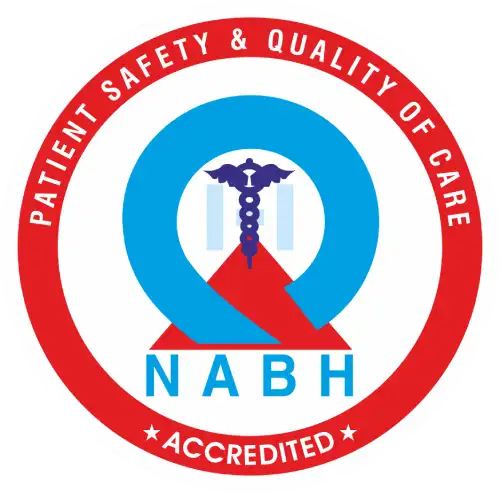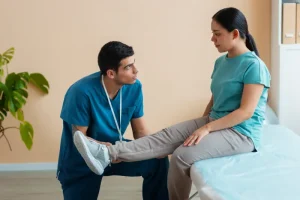Traumatic Brain Injury: Understanding Long-Term Consequences and Treatment Options
Traumatic Brain Injury (TBI) is a serious medical condition affecting millions of people worldwide. It occurs when an external force causes brain damage, leading to a wide range of physical,…
By Aadicura | 22 April 2023Traumatic Brain Injury (TBI) is a serious medical condition affecting millions of people worldwide. It occurs when an external force causes brain damage, leading to a wide range of physical, cognitive, and emotional symptoms.
Some of the leading causes of TBI are falls, road traffic accidents, vehicle crashes, assaults, gunshots, explosions, blasts, etc.
We at Aadicura Superspeciality Hospital, with its team of best brain specialists in Vadodara, lays emphasis on prompt treatment of traumatic brain injury, as it is crucial for anyone who experiences a TBI, regardless of the severity of the injury. The first step is to seek medical attention immediately, as a delay in treatment can lead to further brain damage and long-term consequences. Our medical team will assess the severity of the TBI, stabilize the patient’s condition, and initiate appropriate treatment. It is essential to understand the symptoms and treatment options available for those who have suffered a TBI since it can have a long-lasting impact on a person’s life and requires specialized medical care.
Symptoms of a Traumatic Brain Injury
Symptoms of TBI can vary depending on the severity of the injury.
Mild TBI may cause symptoms such as:
● Headaches
● Dizziness
● Confusion3
While severe TBI can lead to:
● Seizures
● Loss of consciousness
● Permanent disability
It is crucial to seek medical attention immediately after a head injury to prevent further damage.
Long-term Consequences of TBI:
TBI can cause long-term consequences that can affect an individual’s quality of life. It can cause a wide range of long-term consequences including:
Physical:
● Seizures
● Chronic headaches
● Dizziness
● Drowsiness
● Nausea & vomiting
● Fatigue
● Loss of balance
● Difficulty with motor functions
Cognitive:
● Memory loss
● Difficulty concentrating
● Communication problems
Emotional:
● Personality changes
● Anxiety
● Depression
● Irritability
Sensory:
● Ringing in the ears
● Bad taste in the mouth
● Blurred vision
● Sensitivity to light and/or sound
● Increased or decreased smelling ability
The severity of these consequences depends on the type and extent of the injury. Some people may recover fully from TBI, while others may experience long-term disability.
Treatment Options for TBI:
The initial care for a patient with TBI should begin at the injury site, with the focus on securing their airway and ensuring that they have adequate ventilation and circulation. For those with moderate or severe TBI, it is crucial to transfer them to a specialized medical facility with neurosurgical capabilities as quickly as possible. Studies have shown that the method of transport, duration of transit, and whether the medical team is led by a physician or paramedic can affect the patient’s outcomes. The primary goals of TBI management are to prevent hypoxia and hypotension, as even a single occurrence of hypotension has been linked to a doubling of mortality and an increased risk of complications.
The treatment of TBI requires a multidisciplinary approach that involves a team of medical professionals, including neurosurgeons, neurologists, rehabilitation specialists, and psychologists. The primary goal of treatment is to stabilize the patient’s condition, prevent further damage, and promote healing.
Depending on the severity of the injury, treatment options may include:
Medications: Medications are an essential component of TBI management, helping to control symptoms, prevent complications, and promote recovery.
Some of the commonly used medications for TBI are:
1. Pain relievers: Pain is a common symptom of TBI. Medications such as acetaminophen, ibuprofen, and opioids are used with caution (since they can be addictive and have side effects such as drowsiness and confusion) to manage the symptoms.
2. Anti-seizure medications: Another potential complication of TBI are seizures. Medications that work by stabilizing the electrical activity in the brain and reduce the risk of seizures are used to prevent them.
3. Anti-anxiety medications: Doctors use medications such as benzodiazepines to manage anxiety and agitation. These medications work by reducing the activity in the brain, promote relaxation and reduce anxiety.
4. Stimulants: Patients often suffer from fatigue and drowsiness after a Traumatic Brain Injury. Medications that promote wakefulness and improve alertness, improve cognitive function, such as attention and memory are used to help patients to cope with TBI.
5. Antidepressants: Depression is a common complication of TBI and medications such as selective serotonin reuptake inhibitors (SSRIs) and tricyclic antidepressants that regulate the levels of neurotransmitters in the brain and help in reducing symptoms of depression and improving mood are used to treat patients suffering from TBI.
Surgery: In severe cases of TBI, surgery may be necessary to remove blood clots, repair skull fractures, or relieve pressure on the brain.
Rehabilitation: Rehabilitation is a critical component of TBI treatment. It includes physical, occupational, and speech therapy to help patients regain lost functions.
If you or a loved one has suffered a traumatic brain injury it is essential to find the best superspeciality hospital in Vadodara that is fully equipped to handle traumatic brain injuries.
When it comes to the best brain hospital in Vadodara, Aadicura Superspeciality Hospital is a popular choice among patients. Here, TBI patients are treated by Dr Sandip Mavani and Ashish Desai, both of whom are considered among the best neurosurgeons in Vadodara.
The hospital has state-of-the-art facilities, experienced medical staff, and a dedicated team of specialists in neurosurgery. It offers a wide range of medical services, including neurosurgery, neurology and rehabilitation
In conclusion, prompt treatment is critical for anyone who experiences a TBI, regardless of the severity of the injury. Seeking medical attention immediately can minimize further brain damage, improve the patient’s overall health and wellbeing, and maximize their chances of recovery. Delayed treatment can lead to severe, long-term consequences, so it is essential to act quickly in the event of a TBI. If you or someone you know experiences a TBI, seek medical attention immediately to ensure the best possible outcome. With proper treatment and rehabilitation, it is possible to recover from TBI and regain lost functions.








